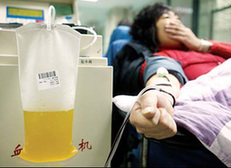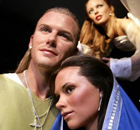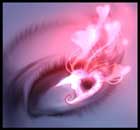Society
Blood screening to be tightened
By Shan Juan in Beijing and Hu Yongqi in Hubei (China Daily)
Updated: 2010-05-13 08:12
 |
Large Medium Small |
Safety matters
China started collecting plasma in 1989 but, by the 1990s, illegal collectors and malpractice at legal centers were causing the spread of deadly viruses. In 2001, 241 villagers in Wenlou, Henan province, were infected with HIV after donating blood and plasma.
Under regulations introduced in March 2008, people must take a blood test before being allowed to donate. Yet the rule is hard to enforce in remote rural areas, say experts.
When China Daily visited the Yunxian center, people were rarely tested before extraction.
 Restoring the trust in the process is vital. A quick survey of 150 people aged 22 to 41 by China Daily found that only 22 donated blood. Ten more said they had thought about giving blood but doubted it was safe. None of them had ever heard of donating blood plasma.
Restoring the trust in the process is vital. A quick survey of 150 people aged 22 to 41 by China Daily found that only 22 donated blood. Ten more said they had thought about giving blood but doubted it was safe. None of them had ever heard of donating blood plasma.
"The best way to solve the problem is to raise awareness of the need for more blood and plasma donations," said Deng Chang'an, a professor in hematology at Sichuan University. "Supply would not be a problem once donating becomes habitual behavior.
"Collection centers also need to make their operations transparent to convince residents that the practice is safe," he added.
The rural residents who donate regularly are either unaware of the risks due to a lack of health education or are more interested in the cash they can make.
About 5,000 of the regular plasma donors in Yunxian live in remote areas. One of them is 49-year-old Yang Wenbao.
"A neighbor told me in 2006 that people can earn 160 yuan selling plasma. He told me he felt good after removing plasma," said the farmer from Zhoujiawa village, which is 30 km from the Yunxian collection center.
The couple makes roughly 4,000 yuan a year selling plasma, a small fortune compared to the 1,600 yuan they make annually from growing wheat.
"Blood is the most precious part of our bodies, so I was shocked when I heard my parents went to sell plasma," said Yang Wenbao's 23-year-old daughter, Yang Min, a migrant worker in Guangdong. "It seems much easier for them to make money by selling plasma."
Regulars at the Yunxian collection center are mostly in their 40s and 50s (the national age limit for donors is 55), while women make up about 60 percent, said Huang Xunwei, deputy head of the clinic.
Unlike young people, older generations generally stay in their hometown to watch over houses and grandchildren left behind by the young people who head to the cities.
"We have difficulties making ends meet," said Zhang Shaozhi, 41, of Gangzigou village, which is 45 km from the center. "Selling plasma is one of the few options we have to make a better living."
Guo Rui contributed to this story.











